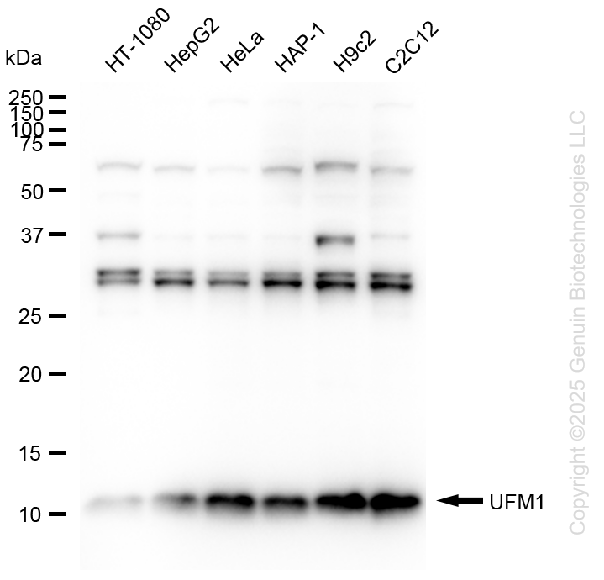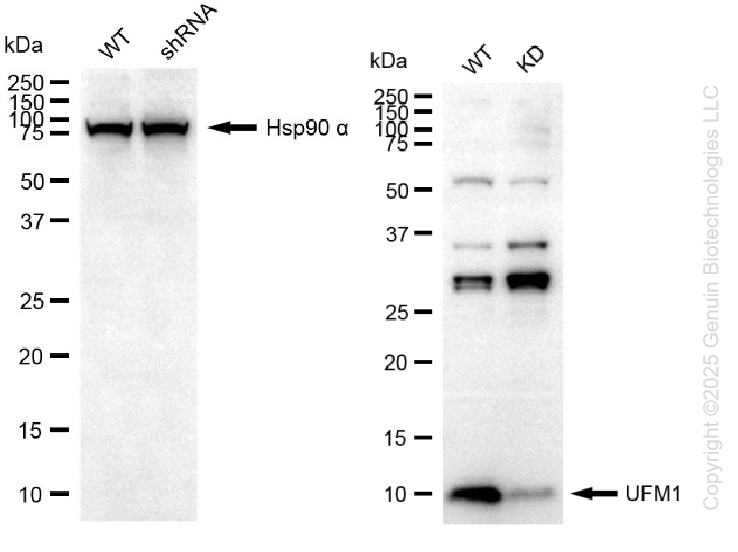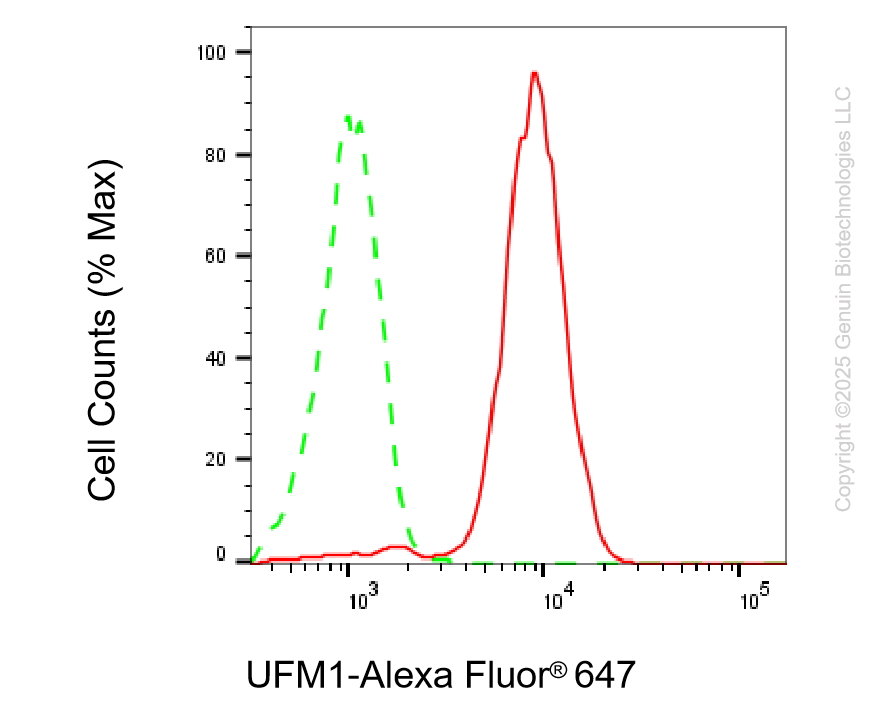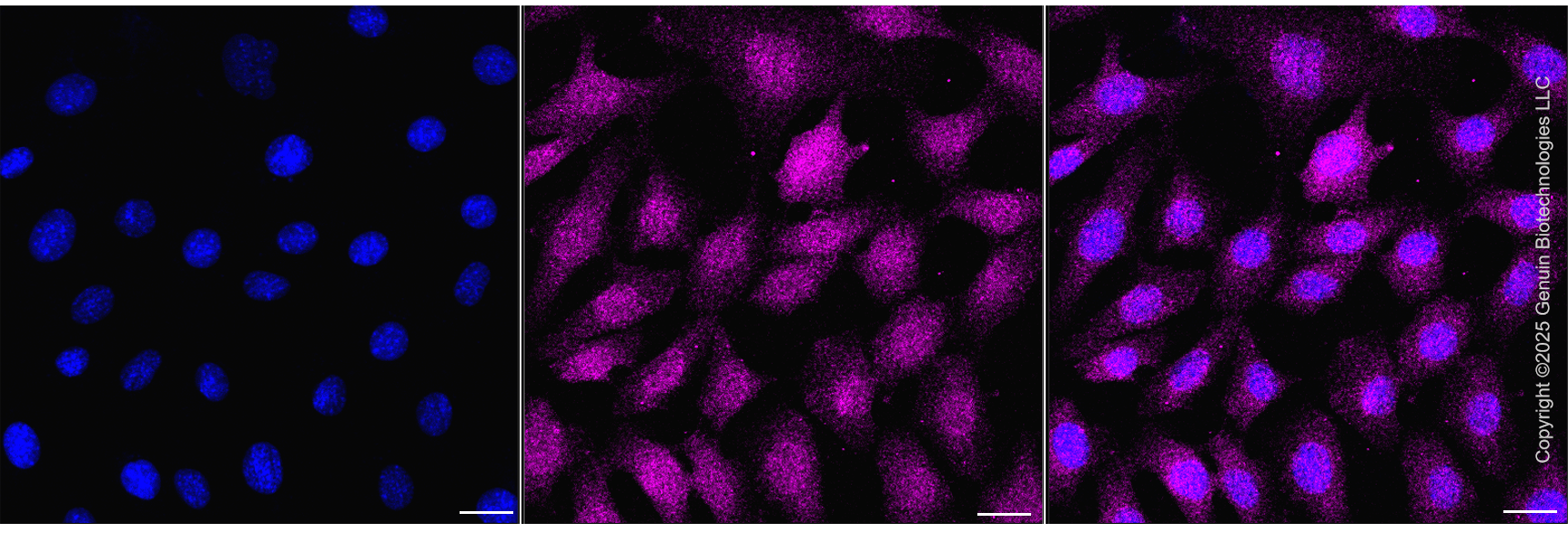KD-Validated Anti-UFM1 Rabbit Monoclonal Antibody
Rabbit monoclonal antibody
- SPECIFICATION
- CITATIONS
- PROTOCOLS
- BACKGROUND

Application
| WB, FC, ICC |
|---|---|
| Primary Accession | P61960 |
| Reactivity | Rat, Human, Mouse |
| Clonality | Monoclonal |
| Isotype | Rabbit IgG |
| Clone Names | 25GB85 |
| Calculated MW | Predicted, 9 kDa; observed, 10 kDa |
| Gene Name | UFM1 |
| Aliases | UFM1; Ubiquitin Fold Modifier 1; C13orf20; Ubiquitin-Fold Modifier 1; BA131P10.1; Chromosome 13 Open Reading Frame 20; BM-002; HLD14 |
| Immunogen | A synthesized peptide derived from human UFM1 |
| Gene ID | 51569 |
|---|---|
| Other Names | Ubiquitin-fold modifier 1, UFM1 {ECO:0000303|PubMed:15071506, ECO:0000312|HGNC:HGNC:20597} |
| Name | UFM1 {ECO:0000303|PubMed:15071506, ECO:0000312|HGNC:HGNC:20597} |
|---|---|
| Function | Ubiquitin-like modifier which can be covalently attached via an isopeptide bond to lysine residues of substrate proteins as a monomer or a lysine-linked polymer (PubMed:15071506, PubMed:20018847, PubMed:27653677, PubMed:29868776, PubMed:30626644, PubMed:38377992, PubMed:38383785). The so-called ufmylation, requires the UFM1- activating E1 enzyme UBA5, the UFM1-conjugating E2 enzyme UFC1, and the UFM1-ligase E3 enzyme UFL1 (PubMed:15071506, PubMed:20018847, PubMed:27653677, PubMed:29868776). Ufmylation is involved in various processes, such as ribosome recycling, response to DNA damage, transcription or reticulophagy (also called ER-phagy) induced in response to endoplasmic reticulum stress (PubMed:25219498, PubMed:32160526, PubMed:38383785). |
| Cellular Location | Nucleus. Cytoplasm |

Thousands of laboratories across the world have published research that depended on the performance of antibodies from Abcepta to advance their research. Check out links to articles that cite our products in major peer-reviewed journals, organized by research category.
info@abcepta.com, and receive a free "I Love Antibodies" mug.
Provided below are standard protocols that you may find useful for product applications.
If you have used an Abcepta product and would like to share how it has performed, please click on the "Submit Review" button and provide the requested information. Our staff will examine and post your review and contact you if needed.
If you have any additional inquiries please email technical services at tech@abcepta.com.














 Foundational characteristics of cancer include proliferation, angiogenesis, migration, evasion of apoptosis, and cellular immortality. Find key markers for these cellular processes and antibodies to detect them.
Foundational characteristics of cancer include proliferation, angiogenesis, migration, evasion of apoptosis, and cellular immortality. Find key markers for these cellular processes and antibodies to detect them. The SUMOplot™ Analysis Program predicts and scores sumoylation sites in your protein. SUMOylation is a post-translational modification involved in various cellular processes, such as nuclear-cytosolic transport, transcriptional regulation, apoptosis, protein stability, response to stress, and progression through the cell cycle.
The SUMOplot™ Analysis Program predicts and scores sumoylation sites in your protein. SUMOylation is a post-translational modification involved in various cellular processes, such as nuclear-cytosolic transport, transcriptional regulation, apoptosis, protein stability, response to stress, and progression through the cell cycle. The Autophagy Receptor Motif Plotter predicts and scores autophagy receptor binding sites in your protein. Identifying proteins connected to this pathway is critical to understanding the role of autophagy in physiological as well as pathological processes such as development, differentiation, neurodegenerative diseases, stress, infection, and cancer.
The Autophagy Receptor Motif Plotter predicts and scores autophagy receptor binding sites in your protein. Identifying proteins connected to this pathway is critical to understanding the role of autophagy in physiological as well as pathological processes such as development, differentiation, neurodegenerative diseases, stress, infection, and cancer.





